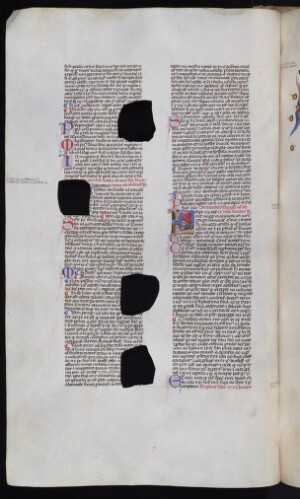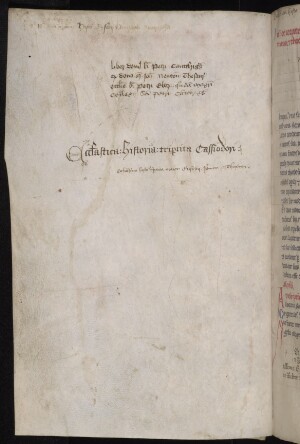The Peterhouse Bequest
Rodney M. Thomson (University of Tasmania)
On 29 June 1414, John Neuton added a lengthy codicil to his will of 4 May, disposing of those of his books that he had not already bequeathed to York Minster. Among them was a group of law books, numbering 35 titles, to be kept in a chest in the Cathedral's vestry, for the use of future male descendants of his brother Thomas, if they should become clerics and study the law. If his brother had no male issue, or if his male heirs should wish to remain as lay persons, then the books were to revert to the Cathedral library. Of the remaining books, 16 titles were left to Neuton's old college, Peterhouse, where he had been Master 1382-1397 (1). The fates of these bequests were quite different. Of all the books left to the Minster (35 volumes), plus those to be kept there in a chest, possibly four of the law books are to be found in the library now (suggesting that his brother either did not have any male heirs, or that they did not claim them). Of those left to Peterhouse, a dozen survive plus another not destined for the college in his will. This last title, Bartolus de Saxoferrato on the Digestum Infortiatum, does appear in the will, but amongst the law books to be kept in the cathedral's vestry. It is unlikely (though not impossible) that Neuton owned two copies (doubtless large and expensive) of the same work, and so one presumes that his executors either made an error or a deliberate change, and this book was diverted to Peterhouse. It is a good deal more splendid than the other volumes of Bartolus surviving at York (MSS XVI. P. 5-7), thought to have been part of his bequest: they are on paper, this on parchment, they have little or incomplete decoration, this had 88 initials (most since cut out), the survivors at least by the well-known Bolognese commercial illuminator Nicolò di Giacomo di Nascimbene, who operated c. 1360-70 (Fig. 1).
All but one of the books which make up the Peterhouse bequest figure in the college's library catalogue of 24 December 1418 (2). Their titles show that they were an interestingly varied group. The Bartolus is the only law book (and the only survivor with notable illumination). Otherwise there are five books of patristic and medieval theology: Augustine, Bernard of Clairvaux and Hugh of St Victor, the Opus imperfectum, Peter Lombard's Sentences, and Thomas Waleys, Pierre Bersuire and Malachius Hibernicus. The remaining ten volumes contained classical, late antique and medieval 'classicizing' literature. Among them, history is prominent: Cassiodorus' Historia Tripartita (Fig. 2), Justin's Epitome, Hugh of Fleury and Martinus Polonus. Frontinus and Vegetius represent the ancient arts of warfare, and the rest cover what may loosely be described as 'belles lêttres': Seneca the Elder's Dialogues with the commentary of Nicholas Trevet, Seneca the younger's letters, philosophical works of Cicero, Macrobius and Martianus Capella, Solinus, Valerius Maximus, extracts from Pliny's Natural History, Sallust, Boethius' Consolatio philosophiae, again with Trevet's commentary, and Alan of Lille's De Planctu Naturae. Probably the titles were chosen with reference to the wishes of the Fellowship, to fill gaps in their collection. None of the volumes are mainstream curriculum textbooks, of which the college doubtless already had a full complement. On the other hand, there was a notable interest in the Latin classics among some of the fifteenth-century Peterhouse Fellowship (John Yotton, John Warkworth), perhaps influenced by the 'new learning' from Italy.
The surviving books from Neuton's bequest reveal a little of how they came to him. They range in date from the twelfth to the early fifteenth century; the earlier ones, then, reached him at second hand. Of those made within his lifetime, three are Italian, the rest English and so possibly commissioned by him, although there are no obvious 'family likenesses'. One wonders whether he acquired those dated around the turn of the fourteenth and fifteenth centuries specifically to use as bequests.
(1) The bare facts of Neuton's biography are laid out in A. B. Emden, Biographical Register of the University of Cambridge to 1500 (Cambridge: Cambridge University Press, 1963), pp. 421-422. His will is printed in Testamenta Eboracensia..., ed. by J. Raine, Surtees Society 4, I (London: Nichols, 1836), pp. 364-371. The section relating to Peterhouse is printed in Corpus of British Medieval Library Catalogues 10: The University and College Libraries of Cambridge, ed. by P. Clarke and R. Lovatt (London: The British Library, 2002), pp. 721-722.
(2) The catalogue of the Peterhouse library, 24 December 1418, is printed in Corpus of British Medieval Library Catalogues 10: The University and College Libraries of Cambridge, ed. by P. Clarke and R. Lovatt (London: The British Library, 2002), pp. 449-548 (UO48). I am preparing a new descriptive catalogue of the Peterhouse manuscripts.
How to cite
Rodney M. Thomson, 'The Peterhouse Bequest', in Hanna Vorholt and Peter Young (eds), 1414: John Neuton and the Re-Foundation of York Minster Library, June 2014, https://yml1414.york.ac.uk/

